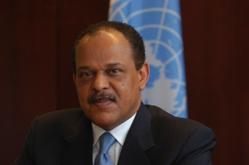19
November
2008

Increasing employment opportunities in the Arab region represents the biggest development challenge. Unemployment leaves decision-makers worried. It is a danger to economic and social development, and a human-resource waster, namely for youth whose share is highest among the unemployed.
UN-ESCWA Executive Secretary, Bader Omar AlDafa, tackled the issues of unemployment and work opportunities from the angle of "Arab Regional Cooperation in Youth-related Social Spheres", at the Arab Forum on Development and Employment organized by the Qatari Labor Ministry and the Arab Labor Organization (ALO), on 15-16 November, in Doha, Qatar.
Challenges and Solutions
Addressing the meeting, AlDafa remarked that the labour market knows constant and quick shifts and turns, which can sometimes be hard to expect and keep pace with. Despite the high growth registered in the Arab region, calculated at an average of 6 percent yearly in 2003-2007, the effect of "this growth over unemployment rates remained limited. Unemployment in the Arab region is the highest worldwide. The first ALO-issued Arab report on employment and unemployment noted that Arab unemployment represents 14 per cent of the total work force, while the number of unemployed youth is 25 per cent".
AlDafa noted as well that in the Arab region, women have made notable gains in access to education. However, these gains were not mirrored in their economic participation. On the other hand, "unemployment is highest in most Arab countries among the educated. They account for unemployment rates that are 10 times higher than other social categories in Egypt, 5 times in Morocco, and 3 times in Algeria. This is an indication to the mismatch between their competences and labor market needs on the one hand and their knowledge and the economic cycle on the other".
Responding to these challenges, Arab countries attempt to create jobs and employ work-seekers, but efforts are still lacking. Innovative solutions are required, such as designing youth-targeted training and educational programs, to enlighten them on the importance of work and its true value. AlDafa proposed the following: "focusing, within vocational trainings, on training women to increase their participation in the labor market in varied occupations; strengthening Arab cooperation to combat unemployment; directing public expenditure towards remote, least-developed areas to achieve justice in resource-distribution on one hand and benefit all citizens, namely poor ones, of the fruits of development on the other hand; and formulating policies to invigorate the economies of the region", among other solutions.
Youth: a Priority
AlDafa also ascertained that "youth issues are at the heart of UN-ESCWA concerns and programs. The Commission is careful to discuss these issues and possible solutions to them in the context of integrated social policies that stress on the concept of association between economic growth and social benefit; to strengthen production sectors that rely on the work force; to link training and educational programs with labor market needs; and to conduct surveys concerning the availability of the work force in exporting countries to train them and enable them to respond to market needs". UN-ESCWA has also issued many studies on the nature of the labor market in the Arab region, and regional cooperation frameworks. In cooperation with other UN agencies and organizations, as well as the League of Arab States (LAS), it has issued a detailed report on the Millennium Development Goals (MDGs) in the Arab region. The report underlined priority issues for Arab youth, including the increase of job opportunities.





